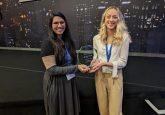Bioanalysis Rising Star Award finalist: Jugal Suthar
The winner will be announced in the coming months! Follow Bioanalysis Zone on Twitter, Facebook or LinkedIn to be the first to find out the winner!
Nominated by: Dr Stefan Guldin, University College London (UK)
Supporting comments:
“I have accompanied the stunning development of Jugal Suthar over the past 4 years. As a member of the prestigious Doctoral Training Centre for Advanced Therapeutics and Nanomedicines, he conducted innovative work on the development of novel bioanalytical methods for the detection of exosomal proteins. His first publication in Analytical Chemistry (10.1021/acs.analchem.9b05736) was well received by the community. Four additional manuscripts will be published from his doctoral thesis. Apart from his remarkable scientific achievements, Jugal showed exceptional commitment towards translation. In 2019, he co-founded Vesynta ltd, which is devoted to the development of companion drug monitoring solutions for personalized medicine. The UCL start-up received so far £0.8M in funding and multiple awards. Furthermore, Jugal played a leading role in our recent NIHR i4i Award (£1M), both in the development of the bid but also in the assembly of our 21-member consortium, comprising world-leading clinicians and academics but also various other stakeholder groups (children, parents, nurses, educators, designers & engineers). In my career to-date, I have never supervised a PhD student of such caliber, combining scientific rigor with such exceptional interpersonal and entrepreneurial skills. In my view, he would truly deserve the Bioanalysis Rising Star Award 2021.”
Describe the main highlights of your bioanalytical work.
My PhD at UCL (2016−2021) marked a collaboration between Pfizer, Depts. of Chemical Engineering and Pharmacy, developing novel biosensing methods incorporating exosomes into liquid biopsies. By combining immuno-functionalization, acoustic wave resonance and electrochemical impedance spectroscopy, with reproducible materials engineering via block copolymer self-assembly and colloidal co-assembly, we created nanoscale orthogonal metallic arrays and inverse-opal porous networks capable of phenotypic exosome analysis in complex biological media at diagnostically relevant concentrations. I leveraged my pharmacy training and passion for medicines optimization to play a leading role in a successful £1m bid to the NIHR Invention-for-Innovation Product Development Award, for the project ‘ChromaDose’. I am now a Research Fellow in Invention for Innovation, whilst also managing the 21-member ChromaDose consortium committed to revolutionizing point-of-care blood analysis for dose-personalization in pediatric oncology, by advancing drug monitoring technologies towards a clinic-ready in vitro diagnostic. My entrepreneurial mindset underpins my role as co-founder and CEO of UCL spin-out Vesynta, an enterprise recognized as a rising star within digital health and med-tech, evidenced by its acceptance onto the KQ Labs program (Francis Crick Institute), and the P4 Precision Medicine Accelerator (Barclays Eagle Labs). I also supervise bioanalytical experts as part of the Innovation Scholars Secondments award after securing two company-led Innovate UK grants totaling £200,000, with a strong focus on technology translation.
[Video edit by Luke Maberly]
In association with






